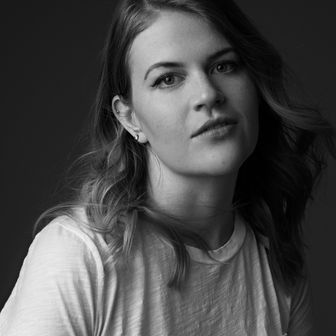
There’s an episode of the new HBO Max show I Hate Suzie that’s all about the protagonist, Suzie (played by the show’s star and co-creator, Billie Piper), trying to decide what to think about while she’s masturbating. Titled “Shame,” the episode follows Suzie as she tries rubbing one out on her back, on her stomach, with a vibrator, without a vibrator. She thinks about her husband, Cob; a guy she saw when she dropped off her kid at school that morning; cops interrogating her in a darkened room; the time in middle school when she kissed a boy in a closet; and an anonymous American soldier on a train. Mostly, she tries to avoid thinking about Carter, the guy she cheated on her husband with, but he keeps popping up.
As she cycles through these images, her subconscious — embodied in Suzie’s mind by her best friend and manager, Naomi (Leila Farzad) — keeps questioning her desires. Why, even in her private fantasies, does she seem to prioritize a man’s pleasure over her own? Why does she still get turned on by the memory of something that happened when she was just a kid? Does she fetishize Black men? Why can’t she just get off thinking about her husband, like a good wife, instead of constantly thinking about Carter? Ultimately, despite her best efforts, she comes while thinking of Carter, and the pleasure of her orgasm is undercut by frustration and disgust.
It’s a compelling episode of television. Rarely does the media portray women’s self-pleasure, let alone explore the emotional experience of it and all the excitement, silliness, confusion, delight, and shame it can bring up. What I kept wondering, though, was how much control Suzie, or anyone else, has over desire. If we wanted to, could we change what we fantasize about? Or does telling ourselves not to think about something when we jerk off just make us think about it more?
The guilt and taboo is a key part of the fun in the first place: Of course, Suzie would be more aroused by thoughts of Carter than by thoughts of her husband. I mean, what’s a sexier image to you: a forbidden tryst with a semi-stranger or a nice, familiar hump with the same person you’ve been humping for years, in the same bed where you sleep and fart and snack and convalesce when you have a cold? The forbidden is naturally more enticing and exciting. In his 1996 book The Erotic Mind, the influential author and sex therapist Jack Morin puts it in simple, mathematical terms: The core erotic equation, he argues, is attraction + obstacles = excitement. So if you feel a little bit guilty about your fantasy, well, maybe that’s part of what makes it a good fantasy.
“Some of the fuel for excitement is guilt,” says Sari Cooper, a therapist, sex coach, and the founder and director of New York City’s Center for Love and Sex. Guilt can be such an arousing feeling, she says, because it’s what’s unknown, and people are curious about boundaries.
Still, while some guilt can add fuel to the erotic fire, too much guilt about our fantasies can obviously be detrimental to our pleasure and to how we feel about ourselves overall. If the stories we tell ourselves about desire and arousal are that they’re inherently bad or are harmful to us and to others, we’re going to have a hard time embracing our own sexuality.
What about the fantasies that don’t necessarily make you feel guilty but just kind of ick you out? Maybe one minute, you’re enjoying a perfectly nice daydream about that hot person who runs shirtless around your neighborhood and then, the next thing you know, they’ve been replaced in your mind by your old, sweaty middle-school science teacher who regularly ate hard-boiled eggs in class. “Brains are curious!” Tex Gibson, a sex therapist in Manhattan, told the Cut over email. “They think curious things. They make curious associations. They have curious responses. And that is NOT limited to the sexual realm! Not by a long shot.” Walking away from a sexual experience — either alone or with others — feeling confused or upset with where your mind went is completely normal, she says.
Fighting too hard against these thoughts is counterproductive anyway. If we try too hard not to think about something, we’re inevitably going to think about it. It just doesn’t work. Instead, we can practice accepting whatever thoughts come up and even give ourselves permission to explore them further — at least in our own minds or with a consenting partner. As Gibson explains, getting aroused by something during a sexual experience doesn’t necessarily mean we want that thing (or that old, sweaty middle-school science teacher) in real life. “Things that are most certainly not sexy in life can be and are very sexy in role play and fantasy,” she says.
One way to think of fantasies is like dreams. You wouldn’t get angry at yourself for a dream you had, nor should you get angry with yourself for what you fantasize about. “We can’t control what we dream,” says Cooper. “It’s our imagination and maybe some anxiety, worries, fears, desires, longings, all mixed together. That’s what fantasies are.”
But what if people are having sexual fantasies that genuinely upset or distress them? What if one’s fantasies include acts that are, say, harmful to others or even illegal? Gibson emphasizes that we are under no obligation to act out our fantasies, either wholly or in part: “Accept that some are best kept entirely as fantasy, and keep them in your mind vault/spank bank for when you want them; accept that some can be enacted in satisfying and consensual ways — if you want them to be.”
Beyond that, while trying to force yourself not to think about something probably won’t help, Cooper says it is possible to broaden the pool of potential fantasies. “We call it a ‘sexual menu,’” she explains. By looking at different videos or images and incorporating those into one’s masturbatory or self-pleasuring practice, a person could turn their limited sexual tasting menu into a massive, varied sexual buffet from which they can pile their pleasure plates high with all sorts of different fantasies.
Maybe the more important question, in the end, isn’t whether we can change what we fantasize about but why we feel as though we have to change it. So much shame around desire comes from the tension between what we think we should want and what we actually do want; Suzie thinks she should be aroused by Cob, but she is aroused by Carter. Aren’t things stressful and challenging enough as is? It seems like the least we can do, as a personal kindness, is to give ourselves permission to think whatever weird little thoughts we want to while we jerk off and enjoy whatever modicum of pleasure those bring.


